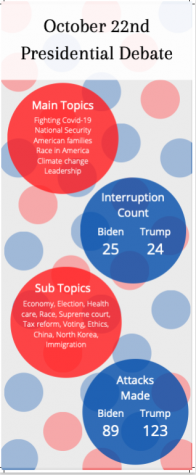Recapping the final presidential debate
October 25, 2020
Drama had begun circulating around the last debate between presidential candidates Donald Trump and Joe Biden before it even began. With Trump testing positive for the coronavirus and turning down a virtual debate, and with Biden announcing on Oct. 15 that he would not participate unless Trump tested negative, many were left speculating whether Thursday’s debate would happen at all. To add fuel to the fire, the Commission on Presidential Debates revealed only two days prior to the event that it would go forward with the unprecedented measure of turning off the candidates’ microphones to prevent interruptions following the public’s overwhelmingly negative response to the first debate.
Yet, when Oct. 22 rolled around, the debate did go on, and those wishing for a revival of the chaotic atmosphere of the first round were left gravely disappointed. Use of the mute button during opening speeches coupled with a strong performance from moderator Kristen Welker managed to pay off. Both candidates exercised self-control while the other was speaking, allowing for more substantive discussion over the divided policy proposals of the candidates and their effects on Americans. Here’s what went down:

Overall Performances:
Neither Trump nor Biden did bad enough to damage their campaign significantly, nor did either do well enough to gain a substantial victory in the polls. An instant poll by CNN after the debate showed that 53% of watchers sampled thought that Biden was the winner, a narrow margin compared to the 62% who thought he won the first face-off. From the last debate to this one, viewership dropped by 10 million, making it the least-watched of all of Trump’s debate performances.
Part of this had to do with Trump’s updated debate tactics: Trump shaped up his strategy this time around, giving off far less of the impression of being an “unfit bully,” as Vox puts it, than he did in the first debate.
The audience could tell through Trump’s uncomfortable facial expressions that he was consistently yearning to respond to comments made by Biden. He managed to restrain himself, though, and many political analysts are calling this a wise move.
The downside of this decision was that it caused him to remain largely on the defensive side of the dynamic until later in the night when interruptions began to occur more frequently and Trump elicited swifter, more relaxed responses. “Donald Trump seemed at times certainly perturbed, but restrained himself and wasn’t going for the jugular,” Director of the Political Communication Institute at the University of Missouri Mitchell McKinney said. “He did not appear to be the authentic Donald Trump.”
The times when Trump did take on an offensive role, his attacks centered mainly around the Biden family’s alleged corruption and painting Biden as a do-nothing politician. He floundered while articulating the argument for the former, delivering a hard-to-follow story about “the laptop from hell,” referencing a recent New York Post story about the emails of Biden’s son Hunter that presumably left all but Trump’s devout base of supporters bewildered.
Similarly, Biden improved his performance from last time based upon delivery. In the absence of consecutive interruptions from Trump, he was able to articulate clearer, more aggressive arguments against his opponent and hit home with his strategy of speaking directly to the American people. He pushed Trump into several blunders by emphasizing his administration’s handling of coronavirus and his focus on the stock market over the working class.
As things devolved in the second half, Biden’s stamina similarly tapered off, and he was heard reaching for words on several occasions.
But the best aspect of his performance was still his juxtaposition to Trump, a point which he has based much of his campaign upon and which rings particularly true to the American people after witnessing the damaging effects of the coronavirus.
Given that current polls show Biden leading the race, Trump needed to have an incredible night in order to guarantee his reelection. He didn’t, and that means that Biden’s mediocre performance will likely be enough to guarantee a clear path to victory.
Recap:
The night started with a segment on the pandemic, an issue on the mind of every American, Edina High School students and staff included. Trump maintained an optimistic attitude in his opening statement, pointing towards the arrival of a vaccine, defending the work of his administration, and repeating a central focus of his campaign: “. . .we’re rounding the corner. It’s going away,” Trump said.
Directly after, Biden called on Trump for his lack of responsibility throughout the pandemic, urging mask-use and ominously warning of a “dark winter” approaching, drawing stark contrast to Trump’s reassuring tone.
This was arguably the strongest segment for Biden, who, with hindsight on the unfolding of the coronavirus, was able to hammer Trump on his failed response. At one point, Biden pointed out that Trump had failed to take responsibility for American coronavirus deaths. “I take full responsibility [for my administration’s handling of COVID-19]. It’s not my fault that it came here—it’s China’s fault,” Trump said in a failed response.
Biden simultaneously used the stage to lay out more details of his plan to deal with the virus: The Biden approach involves economic stimulus and more rapid testing.
A key issue of contention was the question of reopening the country. While Trump called for a quick reopening of schools and businesses, condemning the “ghost town” of New York City, Biden was more cautious, wanting a reopening of the economy guided by federal health standards. “I don’t look at [COVID-19] in terms of the way he does, blue states and red states. They’re all the United States,” Biden said.
Trump’s take on how schools ought to deal with COVID would have EHS students back in person full time, as soon as possible. “I want to open the schools. The transmittal rate to the teachers is very small,” he said. According to Trump, schools shouldn’t worry about students getting infected with coronavirus because of their strong immune systems.
Biden, on the other hand, offered an image of schools opening that bears plenty of similarities to EHS’s current model. He suggested that districts wait until their coronavirus infection rates are “under control,” before opening schools back up with limited class sizes.
The next segment was national security, with interference in American elections on the table. Biden began, repeating three times that foreign nations such as Russia and Iran will “pay a price” for “interfering with American sovereignty.” He hesitated before attacking Trump for his leniency on Putin and calling his lawyer Rudy Giuliani a “Russian pawn.”
Trump responded with an accusation that Biden received 3.5 million dollars from Putin, an indictment that would continue to serve as a focal point for the rest of the debate. “[Russia was] paying you a lot of money, and they probably still are,” he said.
Biden denied these claims unequivocally, shifting the blame to Trump by bringing up his unreleased tax returns and accusing him of holding a secret bank account in China. “What are you hiding?” Biden asked. Trump said he would release his taxes soon, continuing to badger Biden on personal corruption.
After a long back and forth between Trump and Biden concerning China and America’s allies, Biden turned to the camera: “It’s not about [Trump’s] family and my family. It’s about your family, and your family’s hurting badly.” Trump latched onto this response, calling it “a typical political statement.” “I’m not a typical politician, that’s why I got elected,” Trump said.
On American families, Biden and Trump sparred over Obamacare. Trump criticized it for being “no good” and promised to provide a better plan, while Biden pushed for “Bidencare,” his plan to expand on Obamacare by adding a public option, while emphasizing that he would not eliminate private insurance. Trump delivered an attack line off of this point, framing Biden as a career politician. “Excuse me, he was there for 47 years—he didn’t do it.” Trump said.
Switching topics to immigration, Trump praised himself for creating “a stronger border” than ever before and called Biden a hypocrite for creating “horrible cages” in which immigrants were detained under the Obama presidency.
Biden got emotional, criticizing Trump’s policy of separating kids from their parents at the border. “It makes us a laughingstock and violates every judge of who we are as a nation,” he said. Meanwhile, Trump could be heard asking Biden “Who built the cages?” in the background.
The next question from Welker centered around “the talk,” which she described as a moment when Black and Brown Americans explain to their children that they may be the victim of a racially motivated attack. When asked if he understood why minority parents fear for their children, Biden said yes, bringing up several examples of injustices African Americans go through: “The fact of the matter is there is institutional racism in America.”
Trump once again called Biden a career politician, touting his own record of investment. “Nobody has done more for the Black community than Donald Trump. And if you look, with the exception of Abraham Lincoln—possible exception—but the exception of Abraham Lincoln, nobody has done what I’ve done,” he said. “I’m the least racist person in this room.” Biden, in turn, called out Trump’s history of racist remarks. “Abraham Lincoln here is one of the most racist presidents we’ve had in modern history,” he responded.
The last policy segment of the night concerned climate change, and per usual Biden and Trump delivered antithetical messages. Trump praised his administration for pulling out of the Paris Accord and reaching energy independence, but Biden made the case for his plan to address global warming, arguing it would “create millions of new, good-paying jobs.”
A focal talking point from the Trump campaign during both the vice presidential debate and Thursday’s debate was Biden’s switching views on fracking. Trump directed the debate back to this point, addressing Pennsylvania to say that Biden would kill fracking.
In his response, Biden said he was looking to transition to the elimination of fracking over time. This struck a nerve with Trump. He interrupted to ask Biden if he would eliminate the oil industry. “I would transition from the oil industry, yes,” Biden said.
In one of his rhetorically strongest lines of the night, Trump ran with that claim. “. . .[B]asically what [Biden’s] saying is he’s going to destroy the oil industry. Will you remember that Texas? Will you remember that Pennsylvania? Oklahoma? Ohio?” he said, in a line reminiscent of his populist attacks against Hiliary Clinton in 2016.
The final question from Welker was on the issue of leadership, specifically what each candidate would say on their inauguration day to American’s who did not vote for them.
Trump went first, taking the opportunity to attack Biden in his final remarks and reiterating the low employment he had maintained “before the plague came in.”
Biden, on the other, used his time to call for an end of division and fear, and pointed towards hope for a greater future. “I’m the American president. I represent all of you whether you voted for me or against me,” Biden said.
And so concludes this cycle of abnormal presidential debates between Biden and Trump. Yet, as the election season winds to a close, these critical last moments will likely not be as sedated as what was seen in Thursday night’s debate. There are only a few days remaining until Nov. 3, and states have already begun preparing for potential riots amid fear that Trump will not provide a peaceful transition of power. This, combined with the unusual circumstances 2020 places us in, is sure to cause a stir in EHS and across the nation.


